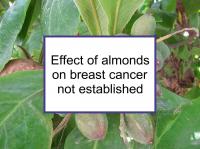By "almond," we mean the nut of the sweet almond tree (Prunus amygdalus dulcis), not bitter almonds (Prunus amygdalus amara). Almonds are an excellent source of insoluble fiber, magnesium, manganese, and vitamin E (α-tocopherol). Almonds are also a good source of monounsaturated fats (primarily oleic acid).
Almonds also contain significant levels of copper and oxalate and some riboflavin, calcium and zinc. In addition, almond skin incorporates several phytochemicals, including kaempferol and quercetin. Almond components have been shown to have high antioxidant and anti-inflammatory properties. Consumption of almonds has been shown in numerous studies to help lower cholesterol, lower blood sugar, and reduce the risk of cardiovascular disease. Habitual almond consumption does not in and of itself appear to lead to weight gain. Almond consumption has been associated with lower risk of colon cancer.
Breast cancer-related effects of eating almonds
Although almonds share some of the favorable characteristics of other tree nuts such as walnuts, there is little specific evidence concerning almond consumption and breast cancer risk.
High intake of dietary fiber and vitamin E (but not vitamin E supplements) have both been reported to be associated with reduced risk of breast cancer.
Almonds should be consumed in moderation since they contain some copper (approximately 0.32 mg per ounce), which can promote angiogenesis (new blood vessel formation). While copper is a vital nutrient, women with breast cancer who are not anemic probably should not exceed the RDA (recommended daily allowance) of approximately 0.9 mg. Refined almond oil contains less than 1% of the copper in raw almonds.
Almond milk
Almond milk is a highly processed food that can be designed to have healthy attributes such as low levels of sugar and saturated fat. Almond milk brands that list carrageenan (a breast carcinogen) as an ingredient should be avoided. Algae-derived carrageenan has been shown to have anticancer properties, however the chemical modifications used to convert carrageenan for use as a thickener in products such as almond milk and yogurt have been reported to make it harmful.
Almond milk normally has significant oxalate content, which can contribute to kidney stone formation in susceptible individuals. Breast cells can also accumulate oxalate, resulting in calcium oxalate microcalcifications. While one study reported that oxalate appears to promote the transformation of breast cells from normal to cancer cells, this has not been confirmed.
Bottom line: High quality almond milk can probably be consumed without harm if used sparingly. However it should not be treated as a "healthy" alternative to dairy or soy products.
Laetrile-based cancer treatment
Laetrile, a synthetic form of amygdalin (found in bitter almonds and apricot kernels), has long been used as an alternative cancer treatment, although it is less popular now than in the 1970s and early 1980s when numerous laetrile clinics in Tijuana, Mexico were established to meet the demand from U.S. cancer patients. The claim that laetrile is an effective and benign cancer treatment is not supported by sound clinical data.
Laetrile has been found ineffective in shrinking tumors, increasing survival time, or alleviating cancer symptoms. Although sometimes referred to as vitamin B17, laetrile is not a vitamin. Some cases of acute accidental cyanide poisoning have been reported with the use of laetrile in combination with vitamin C. Vitamin C is known to increase the conversion of amygdalin to cyanide and reduce body stores of cysteine, which is used to detoxify cyanide.
Additional comments
Ideally, almonds should be eaten unroasted and with their skins on.
Marzipan is a somewhat healthier confection than most sweets, as long as it is made with ground sweet almonds. Almond paste has a lower ratio of almonds to sugar than marzipan and is therefore less desirable. Marzipan made with a substantial portion of bitter almonds or peanuts, and persipan made with apricot or peach kernels, should be avoided.
Pure almond extract normally is manufactured using a small amount of bitter almond oil but is relatively safe in small quantities, especially when used in baking and other cooking methods involving heat.
(Sweet) almond oil can safely be used in the massage of seriously ill patients and patients undergoing chemotherapy. On the other hand, bitter almond oil, which can cause cyanide poisoning, should not be ingested or used on the skin unless it is prussic acid (cyanide)-free.
Sources of information provided in this webpage
The information above, which is updated continually as new research becomes available, has been developed based solely on the results of academic studies. Clicking on any of the underlined terms will take you to its tag or webpage, which contain more extensive information.
Below are links to recent studies concerning this food and its components. For a more complete list of studies, please click on almonds.
